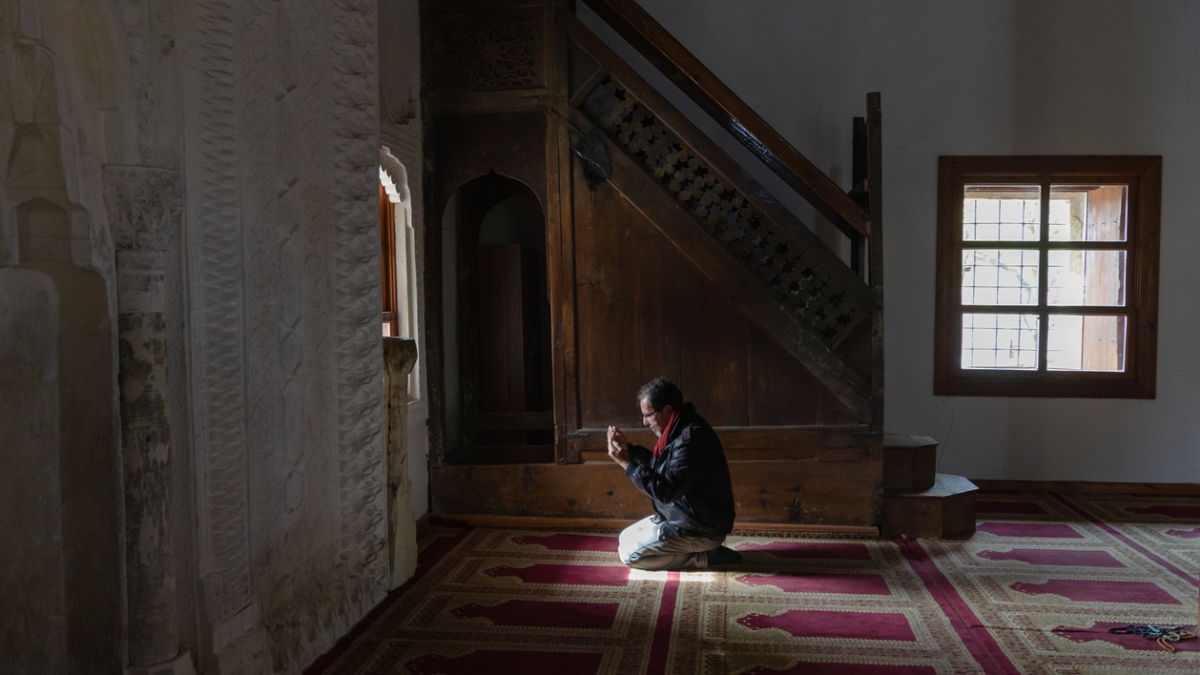God’s True Concept and Its Relevance to Humankind

The true and objective concept of God must come from God Himself, as humans have no ability to comprehend God (6:103):
لَّا تُدْرِكُهُ الْأَبْصَارُ
There is nothing like unto Him (42:11):
لَيْسَ كَمِثْلِهِ شَيْءٌ
All the concepts of God designed by human minds are, therefore, subjective. Also, the true and objective concept of God can only be found in God’s final revelation, the Quran. This is because both Muslim and non-Muslim research scholars agree that the Quran has been preserved in its Arabic text exactly as it was revealed by God around 1400 years ago. [Maurice Bucaille, “The Bible, The Quran and Science”]. This cannot be said of any other religious book extant today. The Quran’s challenge for any group or individual to produce a book, or even a chapter, or even ten verses like the Quran is still outstanding (17:88, 2:23, 8:31, 10:38, and 11:13).
Also, a proper concept of God requires a proper understanding of the human “self.” This is because there is no other creature in the Universe that is endowed with “self.” After going through the various physical stages of human creation (23:12-14; and 32:7-8), the Quran says that every human being is endowed by God with a “self” or soul (‘rooh’ in the words of the Quran or “khudi” in the words of Iqbal) (32:9):
ثُمَّ سَوَّاهُ وَنَفَخَ فِيهِ مِن رُّوحِهِ
This exclusive divine gift of “soul” to every human makes him a uniquely new creation compared to rest of the creation in the entire universe (23:14):
ثُمَّ أَنشَأْنَاهُ خَلْقًا آخَرَ
However, this is given in latent form and the purpose of human life is to develop, nourish, and strengthen it. Just as there are laws governing the nourishment of the human body, there are laws governing the nourishment of the human “self.”
Developing the self (or soul) is the most important thing for our success in the Hereafter which is what truly counts. The Qur’an says that those who develop and nourish their souls will succeed (91:9) while those who don’t will fail (91:10) on the Day of Judgment.
قَدْ أَفْلَحَ مَن زَكَّاهَا ﴿﴾ وَقَدْ خَابَ مَن دَسَّاهَا
(91:9-91:10) – To a happy state shall indeed attain he who causes this [self] to grow in purity, and truly lost is he who buries it [in darkness]. [Asad]
Since the human “self” is not a material thing it does not die with the death of the human body. A developed “self” marches onward in its journey in the hereafter (7:8, 23:102, 101:6). The Quran calls this developed state of the “self” Jannah (Heaven), which will continue forever (7:42):
وَالَّذِينَ آمَنُوا وَعَمِلُوا الصَّالِحَاتِ لَا نُكَلِّفُ نَفْسًا إِلَّا وُسْعَهَا أُولَـٰئِكَ أَصْحَابُ الْجَنَّةِ ۖ هُمْ فِيهَا خَالِدُونَ
On the other hand, an undeveloped “self” gets stuck and is not able to move forward in its journey in the hereafter (7:9):
وَمَنْ خَفَّتْ مَوَازِينُهُ فَأُولَـٰئِكَ الَّذِينَ خَسِرُوا أَنفُسَهُم بِمَا كَانُوا بِآيَاتِنَا يَظْلِمُونَ
The Quran calls this stagnant state of the “self” Jahannam or Ja‘heem (Hell). Ja‘heem means static or stationary.
Therefore, development of the “self” is the purpose of human life on earth.
But the development of the “self” can occur only through society. Being different in nature, the “self” develops on a different plane and with a different set of values than the material body. The body develops by taking, but the “self” develops by giving. Giving up a lesser value, e.g. wealth and material things, including the body, for the sake of a higher, permanent value, e.g., universal freedom and justice, universal welfare and respect for all humanity leads to the development of the “self.” When such permanent values are neglected in society, the “self’ is weakened. Thus the development and nourishment (or purification) of the “self” cannot occur by leading a solitary life and meditation. Unlike other religions, the Quran states that the nourishment and development of the “self” requires inter-actions among human beings. The Quranic concept of God differs from all other concepts of God in that the Quran requires power to establish a political, economic, and social structure based on Quranic universal, permanent values which will allow and encourage the development of the “self” of individuals (8:26, 22:41). This was practically demonstrated by the Prophet (PBUH) by establishing such a state in Medina:
وَعَدَ اللَّـهُ الَّذِينَ آمَنُوا مِنكُمْ وَعَمِلُوا الصَّالِحَاتِ لَيَسْتَخْلِفَنَّهُمْ فِي الْأَرْضِ
(24:55) – God has promised those of you who have attained to faith and do righteous deeds that, of a certainty, He will cause them to accede to power on earth. [Asad]
The “self” is affected by social and economic dealings especially when conflicts of interest arise between individuals, groups, or nations. That is why Islam emphasizes Jama‘ah or togetherness. “There is no Islam without Jama‘ah,” said Khalifa ‘Umar (R) [Jame‘e Ibn ‘Abd-al‘Aziz]. Jama‘ah does not mean just praying together but also working together in unison in all aspects of life. The Prophet (PBUH) is reported to have said: “Anyone who gets even one foot away from the Jama‘ah has taken out the Islamic yoke from his neck, even if he prays and fasts.” [Riwayah ‘Ahmad Wal-‘Hakim]
The Quran is extremely firm and explicit about it:
وَاعْتَصِمُوا بِحَبْلِ اللَّـهِ جَمِيعًا وَلَا تَفَرَّقُوا
(3:103) – And hold fast, all of you together, to the Rope of Allah (i.e. this Quran), and be not divided among yourselves. [Hilali & Khan]
Creating divisions within Islam is therefore against this clear and explicit order of Allah.
The Quran further says that creating sects within Islam is Shirk:
وَلَا تَكُونُوا مِنَ الْمُشْرِكِينَ ; مِنَ الَّذِينَ فَرَّقُوا دِينَهُمْ وَكَانُوا شِيَعًا ۖ كُلُّ حِزْبٍ بِمَا لَدَيْهِمْ فَرِحُونَ
And be not ye among Mushrikeen (those who join gods with God), - i.e., those who split up their Religion, and become Sects, - each party rejoicing in that which is with itself! (30:31-32) [Yusuf Ali]
And the Quran tells that the Prophet (PBUH) has nothing to do with those who are divided into sects:
إِنَّ الَّذِينَ فَرَّقُوا دِينَهُمْ وَكَانُوا شِيَعًا لَّسْتَ مِنْهُمْ فِي شَيْءٍ ۚ إِنَّمَا أَمْرُهُمْ إِلَى اللَّـهِ ثُمَّ يُنَبِّئُهُم بِمَا كَانُوا يَفْعَلُونَ
As for those who divide their religion and break up into sects, thou hast no part in them in the least: their affair is with God. He will in the end tell them the truth of all that they did. (6:159) [Yusuf Ali]
Moreover, our Bond with God is only through His Book, the Quran that serves as our code in all aspects (social, political, economic, jurisdictional, martial, etc.) of life. Turning away from the problems of life and engaging in prayers and meditation in seclusion in order to achieve piety and closeness to God is therefore contrary to the teaching of the Quran. As Allama Iqbal says:
“If you are not able to handle the problems of earth, then it is useless to be meditating and praying about heaven.” [Dharb-e Kalim]
In addition, the development of the “self” is not imaginary but real and tangible, requiring a standard or touchstone against which its development can be measured. And that touchstone is the most balanced attributes of Allah called Asmaaul-‘Husnaa:
وَلِلَّـهِ الْأَسْمَاءُ الْحُسْنَىٰ فَادْعُوهُ بِهَا ۖ وَذَرُوا الَّذِينَ يُلْحِدُونَ فِي أَسْمَائِهِ ۚ سَيُجْزَوْنَ مَا كَانُوا يَعْمَلُونَ
(7:180) – AND GOD'S [alone] are the attributes of perfection; invoke Him, then, by these, and stand aloof from all who distort the meaning of His attributes: they shall be requited for all that they were wont to do! [Asad]
The Quran demands from anyone professing to be a Muslim to make these most beautiful attributes of Allah, as given in the Quran, the goal of life: “That to thy Rabb (The Nourisher and Sustainer) is the final Goal” (53:42):
وَأَنَّ إِلَىٰ رَبِّكَ الْمُنتَهَىٰ
Instead of merely claiming our belief in God with our tongues, or expressing it by the mechanics of rituals and customs, the Quran asks us to express our praise for God by emulating the Asmaa-ul-Husnaa in our lives (1:1-2, 59:23-24).
The Quran further says that we have to believe the way The Prophet (PBUH) did:
فَإِنْ آمَنُوا بِمِثْلِ مَا آمَنتُم بِهِ فَقَدِ اهْتَدَوا
(2:137) – And if [others] come to believe in the way you believe, they will indeed find themselves on the right path [Asad]
This means that our life’s goal should be to get in sync with the Will (Guidance) of God. However, getting in sync with the Will of God is only possible through a universal social order established on the basis of the Quranic principles as shown by the Prophet (PBUH) by practically implementing it in Medina. Therefore, our relationship with God cannot be a personal, subjective, an imaginary affair according to the concept of God as given in the Quran.
Universality of God's Law
In the physical world, we readily accept the universality of God’s laws. For example, an experiment to liberate hydrogen and oxygen from water will produce the same result under the same conditions no matter where that experiment is conducted. We owe our health and welfare, and even our life to the universality of these laws.
The same applies to another set of God’s laws now safely preserved in the Quran. It does not matter if we believe in them or not. These laws have their own objective existence and they work inexorably in the human world just as the laws of nature work in the physical world. The God of the Quran is the Nourisher and Cherisher of all the worlds (Rabbil ‘Alameen) and the Nourisher and Cherisher of all humankind (Rabbin-Naas). He is the Sovereign (Malikin-Naas) and God of all humankind (Ilaahin-Naas).
Therefore, in this concept of God, there is no place for discrimination based on gender, race, ethnicity, language, economic opportunities, political power, or social status. The Quranic God is equidistant from every human being. Only those people who synchronize their wills with the will of God get their “color” from Him. In turn, those who get colored by God reflect universal God-like attributes and become members of one family. In this way, there is no contradiction in their inner and outer lives. With this concept of God, there is no push and pull, no effort through prayers and rituals to bend God in anyone’s favor.
As we have seen, the concept of God presented by the Quran is quite different than all other concepts of God designed by human beings. The Quran is God’s Constitution. Quran’s God is not a dictator. He does not act in an arbitrary manner. Our Prophet (PBUH) was not dictator or a king. Remember ‘Aisha’s (R) saying that the Prophet (PBUH) was a walking Quran. There must be something wrong in our concept of God which has made us turn away from the true God that our Prophet (PBUH) and Sahaaba (R) lived and died for. While they had dignity and power, we are humiliated and live at the mercy of others. How can we regain our lost dignity and glory? There is no other way than to come back to the true concept of God given in the Quran and demonstrated by our Prophet (PBUH) and the Sahaaba (R). Let us proclaim and act upon the verse: We take our color from Allah, and who is better than Allah at coloring (2:138). [Pickthall]
Topics: Prophet Muhammad (S), Quran, Soul (Nafs)
Views: 2424
Related Suggestions

















